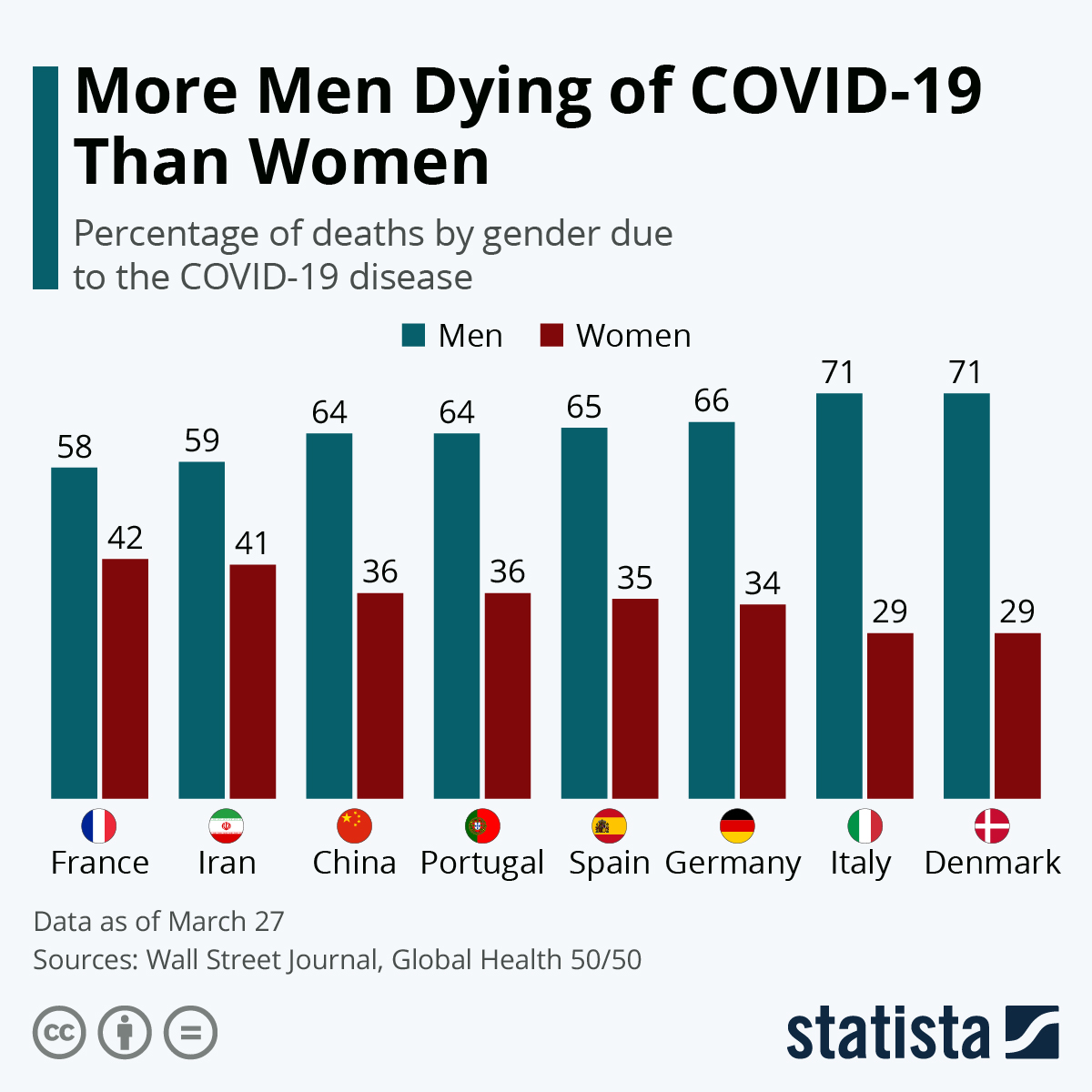The new Coronavirus may affect more men than women: Analysis
Relevance: Sociology: (vi) Population Dynamics: (a) Population size, growth, composition and distribution. (b) Components of population growth: birth, death, migration. (c) Population policy and family planning. (d) Emerging issues: ageing, sex ratios, child and infant mortality, reproductive health. & G.S paper I: Society and social issues: G.S paper III: Science
Background
Reports of the new coronavirus first surfaced in early December 2019 in Wuhan, China.

Men are more likely to die from new virus
New research from China has found that men, particularly middle-aged and older men, are having a harder time fighting off the virus than women. Chinese researchers found that while the infection rate among men and women is the same, the death rate among men is 2.8% compared with 1.7% for women.
According to Sabra Klein, a scientist at the Johns Hopkins Bloomberg School of Public Health, the pattern—men faring worse than women—is consistent with other viral respiratory infections. “Women fight them off better,” she said.
Officials noticed this gender difference during the SARS and MERS outbreaks as well, according to Caryn Rabin.
For instance, research found that in 2003 more women were infected by SARS in Hong Kong, but men died at rates 50% higher than women. And during the MERS outbreak, 32% of men died of the infection compared with 25.8% of women.
Why are men more likely to die from the new coronavirus?
According to researchers, there are a few reasons men are more likely to die from the new coronavirus.
Women have a heightened immune response
Research on previous outbreaks shows that women have stronger immune responses to coronaviruses.
For instance, in one experiment, researchers exposed mice to SARS and found male mice were more susceptible to the infection and were slower to clear the virus.
They also died at higher rates and experienced more lung damage, according to Stanley Perlman, senior author of the study and a professor of microbiology at the University of Iowa.
Men and women have different health behaviors, conditions
Patients’ existing health conditions and health behaviors can make them more susceptible to the virus, and increase their risk of death.
When it comes to health behaviors, China has the largest population of smokers in the world at 316 million people, but while more than 50% of Chinese men smoke, only about 2% of Chinese women partake in the behavior.
Men also have higher rates of high blood pressure, Type 2 diabetes, and chronic obstructive pulmonary disease than women, all of which can increase the risk of complications and death from a coronavirus infection.
According to a few unpublished Chinese studies, patients with delayed coronavirus diagnosis or who had pneumonia at the time of their diagnosis have an increased risk of death.
And one study suggests men may be waiting to seek care, as they were more likely than women to present at hospitals with the disease at a more advanced stage.
Akiko Iwasaki, a professor of immunology at Yale University, added that men may have a “false sense of security” about coronavirus and similar diseases. When the outbreak first started, for instance, officials recommended that people wash their hands thoroughly and often to prevent infection, but multiple studies have found that men are less likely to wash their hands and use soap than women.
Men do not seek help
Men’s health literacy and behaviour are very different from that of women.
Men are less likely to pay a visit to their GP and also less likely to acknowledge illness or seek help when they are sick.
Studies suggest that the reason for this difference is due to a perceived “femininity” of health concerns, and that risk-taking behaviours are a masculine trait.
It may therefore be that while both men and women are contracting the virus equally, women are seeking medical help earlier, while men are waiting until their symptoms have become severe, thereby reducing their chances of survival.
Immune system responses
From studies of other viruses, including other coronaviruses, we know that women provoke a greater immune response to a viral attack than men.
This means that women are generally quicker to clear a virus, and to reduce its viral load – the quantity of the virus in an infected person.
The unfortunate payoff for this more efficient immune response is that women are more likely to suffer from autoimmune conditions as a result. In addition to being more efficient at producing antibodies against the pathogen, women may also be producing more “self-reactive” antibodies – those capable of attacking the body’s own tissue, resulting in autoimmune conditions.
The slower, less efficient response of the male immune system may be one of the reasons why COVID-19 affects men more significantly overall.
Hormones
A suggested explanation for the immunological difference between men and women may be due to hormones.
Studies have shown that immunity to viruses varies with changes in hormone concentrations, which occur at different stages of the menstrual cycle, and which can be affected by taking contraception, during pregnancy and after the menopause.
Therefore, it is feasible that female hormones might be, in part, responsible for the COVID-19 gender imbalance.
This theoretical difference was researched in animal studies during the SARS outbreak in 2002 to 2003. When researchers removed the ovaries of mice, which produce the female hormone, oestrogen, or treated the female mice with a chemical that blocked the effects of oestrogen, they found that the mice’s susceptibility to SARS increased and resulted in an increased rate of death
This implies that oestrogen has a protective effect in mice infected with SARS.
As the SARS virus and COVID-19 share 79 percent of the same genetic sequencing, it is possible that a similar mechanism may be at play with COVID-19.
X chromosome
Another reason that women’s immune systems may function differently is because of the extra X chromosome that women have.
Women have two X chromosomes (XX) while men only have one (XY), and this is considered relevant to immune response because a significant number of genes that regulate our immune response are coded on the X chromosome. This is theoretical. However, it may be that having the second X confers some advantage.
While there has been no firm explanation yet for why more men are affected by COVID-19, we are likely to understand more about this as we receive more information from immunology and antibody studies.
The differences that underpin the sexes are complex and I suspect that the answer lies in the combination of behavioural, immunological, hormonal and genetic factors.
For more such notes, Articles, News & Views Join our Telegram Channel.
Click the link below to see the details about the UPSC –Civils courses offered by Triumph IAS. https://triumphias.com/pages-all-courses.php

